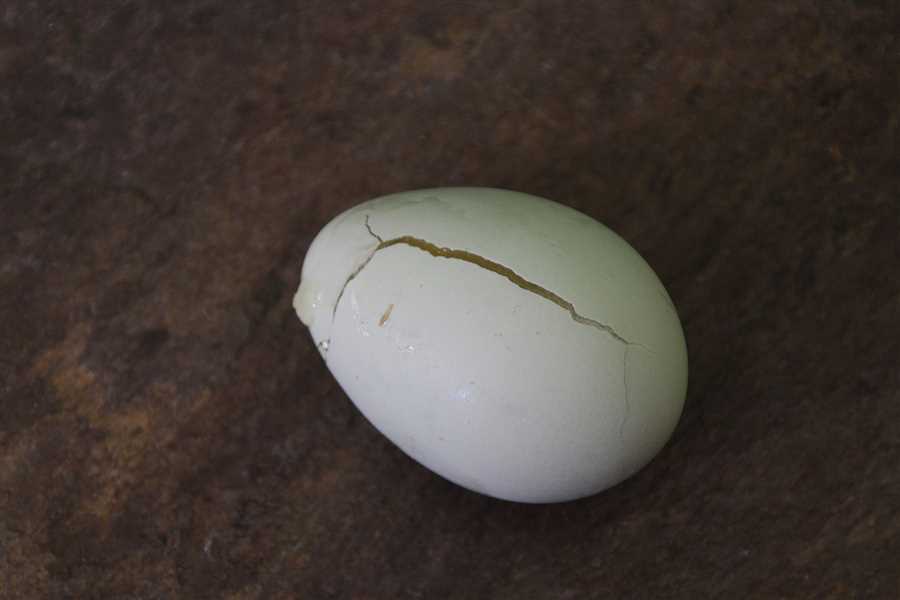When it comes to storing eggs, many people wonder if it is safe to freeze them. Freezing can be a convenient way to preserve eggs and extend their shelf life. However, there are some guidelines to keep in mind when it comes to freezing and consuming cooked frozen eggs.
First and foremost, it is important to note that freezing eggs can alter their texture. When eggs are frozen, the water inside them expands, which can lead to changes in their structure. As a result, frozen eggs may become slightly watery and have a different texture when thawed. Nevertheless, they are still safe to eat.
So, can you eat cooked frozen eggs? The answer is yes, you can. As long as eggs are cooked thoroughly before freezing, they can be safely consumed after thawing. Freezing cooked eggs is a great option for meal prepping or for those times when you have an abundance of eggs and need to store them for future use.
It is important to follow proper freezing and thawing procedures to ensure the eggs remain safe to eat. Cooked frozen eggs should be stored in airtight containers or freezer bags to prevent freezer burn and absorption of odors. When thawing, it is recommended to defrost them in the refrigerator overnight to minimize the risk of bacterial growth.
In conclusion, freezing cooked eggs is a safe and convenient way to store them for future consumption. As long as proper freezing and thawing procedures are followed, cooked frozen eggs can be a tasty and nutritious addition to your meals. So go ahead, cook those eggs and freeze them for later use!
Defrosting frozen eggs
When it comes to defrosting frozen eggs, there are a few important considerations to keep in mind to ensure both safety and quality.
Thawing Methods
There are three main methods for thawing frozen eggs:
- Refrigerator thawing: Place the frozen eggs in the refrigerator and let them thaw slowly over 24 hours.
- Cold water thawing: Place the frozen eggs in a sealed plastic bag and submerge them in cold water. Change the water every 30 minutes until the eggs are completely thawed.
- Microwave thawing: Defrost the eggs using the microwave’s defrost setting or a low power setting. Make sure to continuously check the eggs to prevent them from cooking.
Precautions
When thawing frozen eggs, it is important to follow these precautions:
- Do not thaw frozen eggs at room temperature, as this can allow bacteria to grow.
- Once thawed, use the eggs immediately. Do not refreeze them, as this can affect their quality and texture.
- Thawed eggs should be cooked thoroughly before consumption to kill any potential bacteria.
Important Note: It is not recommended to freeze raw eggs in their shells, as they can expand and crack during freezing. Instead, beat the eggs and freeze them in an airtight container.
By following these guidelines, you can safely and effectively defrost frozen eggs for your culinary needs.
Benefits of using frozen eggs
Using frozen eggs can offer a number of benefits, including:
- Convenience: Frozen eggs can be stored for a longer period of time, allowing you to have a ready supply of eggs whenever you need them. This can be especially helpful for busy individuals or families.
- Reduced waste: By freezing eggs, you can reduce the likelihood of them going bad and being wasted. This can help you save money and be more environmentally friendly.
- Year-round availability: With frozen eggs, you can enjoy eggs even when they are out of season or during times when fresh eggs may not be readily available. This can be particularly useful for recipes that require eggs as an ingredient.
- Retained nutritional value: Freezing eggs can help preserve their nutritional value, including essential vitamins, minerals, and protein content. This means that you can still benefit from the same nutritional value as fresh eggs when using frozen eggs in your cooking.
- Versatility: Frozen eggs can be used in a variety of recipes, including baking, cooking, and making sauces. They can be easily thawed and used as a substitute for fresh eggs, without compromising the taste or texture of your dishes.
Overall, using frozen eggs can provide you with a convenient and reliable source of eggs, while minimizing waste and preserving their nutritional value. Whether you simply want to have eggs on hand at all times or need them for a specific recipe, frozen eggs can be a great option to consider.
How to cook frozen eggs
When it comes to cooking frozen eggs, it’s important to follow the proper steps to ensure safety and the best results. Here is a simple guide on how to cook frozen eggs:
Thawing the eggs
Before cooking frozen eggs, it is necessary to thaw them properly. To do this, you can leave them in the refrigerator overnight. Alternatively, you can place the frozen eggs in a bowl of cold water, making sure to change the water every 30 minutes until they are completely thawed.
Cooking the eggs
Once the frozen eggs are thawed, you can cook them just like fresh eggs. Here are a few methods you can use:
| Method | Description |
|---|---|
| Scrambled eggs | Beat the thawed eggs in a bowl and season with salt and pepper. Heat a non-stick pan over medium heat, add a bit of butter or oil, and pour in the beaten eggs. Cook, stirring occasionally, until the eggs are fully cooked. |
| Fried eggs | Heat a non-stick pan over medium-low heat and add a little butter or oil. Gently crack the thawed eggs into the pan and cook until the whites are set but the yolks are still runny, or to your desired doneness. |
| Poached eggs | Bring a pot of water to a simmer and add a splash of vinegar. Crack the thawed eggs into individual ramekins or cups. Create a gentle whirlpool in the simmering water and carefully slide the eggs into the center of the whirlpool. Cook for about 3-4 minutes for a soft poached egg. |
These are just a few ways to cook frozen eggs, but you can also use them in other dishes like omelettes, quiches, or egg-based bakes. It’s important to note that the quality of the frozen eggs may differ slightly from fresh eggs, but they can still be used in various recipes.
Remember to always handle and cook frozen eggs safely to prevent the risk of foodborne illnesses. Enjoy your deliciously cooked frozen eggs!
Safety precautions when handling frozen eggs

When it comes to handling frozen eggs, it is important to take certain safety precautions to ensure that you are protecting yourself and others from potential health risks. Here are some guidelines to follow:
Thaw eggs properly: It is crucial to thaw frozen eggs safely to prevent the growth of harmful bacteria. Always thaw eggs in the refrigerator and never at room temperature.
Keep eggs separate: To avoid cross-contamination, be sure to keep frozen eggs separate from other foods in your fridge. Store them in a sealed container or a plastic bag to prevent any potential leakage.
Cook eggs thoroughly: Frozen eggs should always be cooked thoroughly to kill any bacteria that might be present. Avoid eating raw or undercooked eggs as they can cause foodborne illnesses.
Practice good hygiene: Wash your hands thoroughly with soap and water before and after handling frozen eggs. This will help prevent the spread of bacteria from the eggs to other surfaces or utensils.
Check for signs of spoilage: Before using frozen eggs, make sure to check for any signs of spoilage, such as an unpleasant odor or abnormal texture. If you notice any of these signs, discard the eggs immediately.
Label frozen eggs: Properly label your frozen eggs with the date of freezing to ensure that they are used within a safe timeframe. Frozen eggs can be stored for up to one year.
Follow storage guidelines: Make sure to follow the recommended storage guidelines for frozen eggs. Keep them at a temperature of 0°F (-18°C) or below to maintain their quality and prevent bacterial growth.
By following these safety precautions, you can enjoy the convenience and nutritional benefits of cooked frozen eggs while minimizing the risk of foodborne illness.
Potential risks of eating cooked frozen eggs
While it is possible to cook and freeze eggs, there are potential risks associated with consuming cooked frozen eggs. These risks include:
1. Bacterial growth
Cooked eggs, when frozen and thawed improperly, can encourage the growth of harmful bacteria such as Salmonella. These bacteria can cause foodborne illnesses and lead to symptoms like diarrhea, abdominal cramps, and fever.
2. Loss of quality

Freezing eggs can lead to a loss of quality in terms of taste, texture, and appearance. The freezing process can cause the eggs to become watery, tough, and less flavorful. This can significantly affect the overall enjoyment of the cooked eggs.
3. Changes in nutritional value
Freezing cooked eggs can also result in changes to their nutritional value. Some vitamins and minerals may be lost or diminished during the freezing process. Therefore, relying on frozen cooked eggs as a sole source of nutrition may not provide the same benefits as fresh, unprocessed eggs.
Overall, while it is technically possible to eat cooked frozen eggs, it is important to be aware of the potential risks involved. It is recommended to prioritize the consumption of fresh, properly stored eggs to minimize the chances of foodborne illnesses and maintain the highest quality and nutritional value of the eggs.
Questions and answers
Can you eat cooked frozen eggs?
Yes, you can eat cooked frozen eggs. Freezing cooked eggs is a safe way to preserve their freshness and extend their shelf life.
What is the best way to cook frozen eggs?
The best way to cook frozen eggs is to thaw them overnight in the refrigerator, and then reheat them in a pan or microwave. Make sure to cook them thoroughly to an internal temperature of 160°F (71°C) to ensure they are safe to eat.
How long can you keep cooked frozen eggs?
You can keep cooked frozen eggs for up to 3 months in the freezer. Make sure to store them in airtight containers or freezer bags to prevent freezer burn and maintain their quality.
Can you freeze raw eggs?
No, it is not recommended to freeze raw eggs. Freezing raw eggs can cause them to expand and potentially burst, creating a mess and compromising their quality. It is best to cook eggs before freezing them.
What are the benefits of freezing cooked eggs?
The benefits of freezing cooked eggs include preserving their freshness, extending their shelf life, and allowing for easy meal preparation. Freezing cooked eggs can also help reduce food waste and save time in the kitchen.






